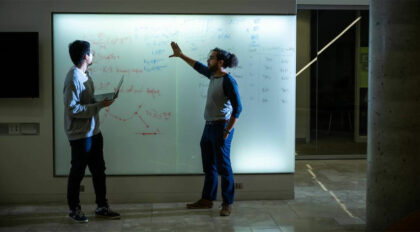Making science matter in everyday walks of life
As the first wave of millions of Ukrainians arrived by train in Poland, fleeing the Russian invasion in February 2022, Kasia Wiech was on a crowded Warsaw train-station platform helping get refugees daily supplies and housing.
“All of Poland was involved in some way in the response, which was beautiful,” says Wiech, who was juggling volunteer service with her work as a Fulbright student researching neural networks at the University of Warsaw.
Working alongside evacuated U.S. Fulbright scholars from Ukraine, she raised more than $2,000 for basic and medical supplies.
The daughter of Polish immigrants, Wiech grew up in south Florida and feels driven to tie science to society – whether through providing soap, baby shampoo, and other basic supplies to refugees or through her planned career in science policy or diplomacy.
As a child, disaster piqued Wiech’s interest in science.
“When Hurricane Wilma hit in 2005, and we didn’t have power for two weeks, my dad and I would lay on our roof and watch the stars. That got me interested in physics,” she says. “And my sister loved to play school when we were kids. She was seven years older, and I remember her using science books as part of her lesson plans.”
She went on to earn a physics degree at the University of Florida, but continued to be motivated by a desire to link people with science.
“My research experience has given me a deep understanding of what the research enterprise looks like, how to think like a scientist and interact with scientists,” says Wiech, who worked in Melissa Skala’s biomedical imaging lab at the Morgridge Institute for Research before graduating with a master’s degree in biomedical engineering this month (August 2024).
“As much as I love research, for me, the human part of everything in science has been really important. Where I shine and where I’m happiest, is in the middle,” she says.
“I think scientists need to make more efforts to show up in public spaces regularly, not just when there’s a crisis. That really brings a culture that recognizes the value that science brings into our lives.”
Kasia Wiech
Working as a National Science Foundation graduate research fellow, Wiech researched autoimmune disorders, especially lupus.
She used patient samples to isolate T-cells and examine them with high-tech microscopes to view metabolic and chemical reactions. Her work was aimed at determining differences between people with inactive forms of lupus and those with more severe symptoms.

While doing that research, Wiech won a grant from SPIE, the international society of optics and photonics, to create an escape room-themed science outreach program for high school students at the Morgridge Summer Science Camps.
The room includes four sets of puzzles that students solve in areas including wavelength and energy, optics and laser alignment, microscopy and slide analysis, and coding and data analysis.
“That kind of thing really drives me and is really fun. And it inspires the next generation of scientists,” she says. “I think scientists need to make more efforts to show up in public spaces regularly, not just when there’s a crisis. That really brings a culture that recognizes the value that science brings into our lives.”
Wiech also earned a graduate certificate in life science communication. “Whether it’s through diplomacy, policy outreach, communication, or advocacy, I want to help make sure that people feel like science is about them and for them,” she says.
Wiech’s Morgridge experience was crucial to her academic path and her future career.
“Working at Morgridge has been a fantastic experience,” she says. “It really gives students the opportunity to explore their full selves and all of their interests by providing mentorship and funding. That’s something that’s unique and really beautiful.”

Rising Sparks: Early Career Stars
Rising Sparks is a monthly profile series exploring the personal inspirations and professional goals of early-career scientists at the Morgridge Institute.
